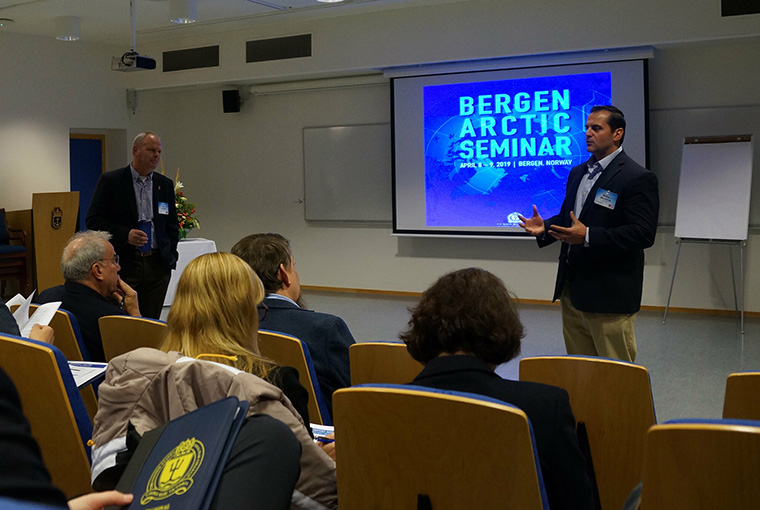Newport Arctic Scholars Initiative Symposium Held in Norway

Seventeen Newport Arctic Scholars Initiative (NASI) researchers and their co-lead scholars from seven Arctic nations met for their capstone meeting at the Royal Norwegian Naval Academy in Bergen, Norway, April 8-9, 2019.
"The nations assembled here have kept the Arctic peaceful and stable and still the only one of our world's oceans that remains free of conflict and war," said Walter Berbrick, U.S. Naval War College (NWC) associate professor and co-lead scholar for NASI. "The strength of the initiative is that despite our differences, we're able to unite around our common goals."
The scholars participated in meetings and discussion groups during the symposium. Some also participated in NWC’s Regional Alumni Symposium, where NASI's results over the preceding 12 months were presented to senior Navy leadership. The focus of the past year has been research on principles for seapower in the Arctic region. They first met in April 2018 and also again in October 2018.
"Our goal this week is to finalize the work you accomplished at our previous meetings. We have agreed on confidence-building measures; sharing awareness and capabilities; exploring rapid regional response and readiness; and building regional partnerships," Rear Adm. Jeffrey Harley, president, Naval War College, wrote in welcome remarks. "These steps, and more, will be necessary to address the future challenges of operating in the changing Arctic environment."
Professor Lars Saunes, co-lead scholar for NASI and retired chief of the Royal Norwegian Navy, who now teaches at the Naval War College, explained how other nations have approached the Arctic.
"China and Russia are adapting to a maritime strategy of promoting soft economic and diplomatic power of influence, combined with development of hard military power to command regional seas," said Saunes. "In many ways the 'Mahan naval strategy' is renewed and redesigned in the Arctic as well as in the South China Sea."
As nations take concrete steps to work together to address shared security and defense challenges, NASI offers a collaborative model for scholarly exchange to help translate theory into practice, officials said.
"Through our initiative, our nations and navies have developed new friendships and partnerships, including the recognition of bringing Russia into future multinational, collaborative research efforts looking at Arctic security issues. This has made all of us smarter, stronger and more secure," said Berbrick.
The Newport Arctic Scholars Initiative is a U.S. Naval War College program that brings together scholars and sailors from Arctic nations to address seapower-related research questions concerning the collective defense and security of the region.
Photos of the event can be viewed and downloaded at https://www.flickr.com/photos/usnavalwarcollegeri/albums/72157677616013767
